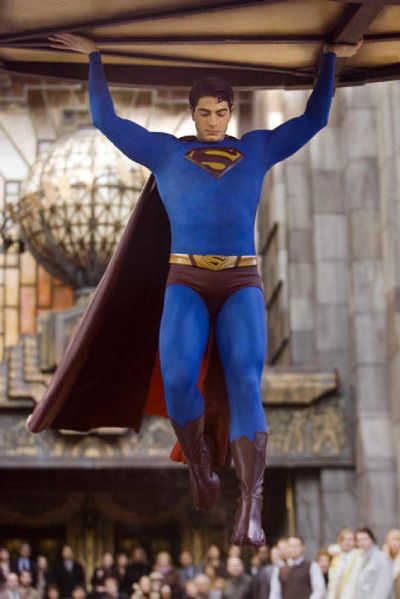Moses, JESUS and Clark Kent

Lots of fans are excited about “Superman Returns,” but few with as much fervor as Steve Skelton. For this Nashville, Tenn., writer and amateur theologian, it is almost religious. Skelton first received the revelation of what he calls the Man of Steel’s “super-secret identity” in 1978. He was 6, watching “Superman: The Movie” with his father. “It was like a religious experience,” he writes in his new book, “The Gospel According to World’s Greatest Superhero.” “It was epic, mythic, even evangelistic. A heavenly father sends his only son to save the Earth,” in what the 1978 movie’s screenwriter described as “a space-age manger.”
For years, writers and theologians have been divining Christian messages from comic-book superheroes, particularly Superman. The new movie is generating even more debate on the subject of superhero spirituality.
Skelton acknowledges a frankly evangelical intent for his book.
“My interest in this is because I am Christian,” he says. “I do want to get this word out. Any time you can celebrate a Christian influence that’s in the culture, you should do that.”
In the past five years, dozens of books have been published exploring the religious themes in pop culture, from “Buffy the Vampire Slayer” to “Lord of the Rings,” “Oprah” to “The Chronicles of Narnia,” “The Sopranos” to “The Matrix.” Critics charge that in some of the less-likely subjects, authors are stretching to find things that aren’t there.
However, Skelton’s latest entry takes the greatest leap – over more than tall buildings. He argues that Superman is a kind of stand-in for Jesus.
“Superman is not Jesus Christ,” he writes. “But he is a Christ figure, a figure resembling Christ – as we all should be.”
Skelton’s is the latest of no less than five books exploring the Christian message of superheroes, each with at least a chapter on the Man of Steel.
Leo Partible, a comic-book author who contributed to “Who Needs a Superhero?” says the new Superman movie is really a discussion of the nature of Jesus.
“The question is, ‘Who is Jesus, and why does he matter?’ ” he says.
Partible, who has seen “Superman Returns,” says that in the film, “the world is definitely in a huge crisis, and the movie actually shows you what it would be like to have a super savior in the real world. It’s not just about a super-savior, but also a model for the Christian struggle.”
Some disagree, arguing that Skelton has leapt to a conclusion greater than Superman’s fabled ability to vault skyscrapers. For example, Jesus walked on water, but he didn’t fly – except in some Gnostic gospels and the Apocrypha.
“I think that Jesus is the opposite of Superman,” says the Rev. Britt Minshall, pastor of the Cathedral Church of St. Matthew in Baltimore. “The ideal that Jesus had in the Bible is so different.”
For the most part, Jesus did not use physical force, and did not use his power to rebel against King Herod’s oppressive regime, or even the Roman soldiers who tormented him.
“That’s what Superman would do,” says Minshall.
In an August 1939 issue of Action Comics, Superman is described as “savior of the helpless and oppressed.” In the new movie’s trailer, the voice of Superman’s father is heard telling the boy, “They can be a great people. They only lack the light to show them the way. For this reason, above all – their capacity for good – I have sent them you, my only son.” The director, Bryan Singer, told Wizard magazine, “Superman is the Jesus Christ of superheroes.”
With all these Christian interpretations, it is logical to ask, What did Superman’s creators intend?
Rabbi Simcha Weinstein, author of “Up, Up, and Oy Vey!: How Jewish History, Culture, and Values Shaped the Comic Book Superhero,” has a theory about what two Jewish teenagers, Jerry Siegel and Joe Shuster, might have had in mind when they created the superhero in 1938.
Weinstein thinks the Man of Steel is drawn from the biblical Moses, whose family set him adrift in a basket of reeds to save his life. Until he became an adult, he had the identity of an Egyptian prince.
“If anyone is claiming him, then I want to claim him as Jewish,” says Weinstein. “The creators of Superman grew up in a Jewish culture, very rich in storytelling and biblical archetypes. Their notions of heroes are of Jewish heroes. Siegel and Shuster were tapping into a very rich tradition inside themselves.”
There may be two religious traditions reflected in Superman – or none, says Reg Grant, who teaches communications arts at Dallas Theological Seminary.
“You can read the Superman myth through Christian glasses or bifocals,” Grant says. “A Christian interpretation or the Jewish would work equally well. The Superman myth underscores the universal longing for a savior, and from the Christian perspective, of course, that savior is Jesus.”
For the Hardaway family of Maitland, Fla., who are evangelical Christians, the debate about Superman’s spiritual dimension is settled. Parents Dan and Lorraine attended a screening last week and loved it.
“We were amazed at the spiritual parallels they used in the movie,” says Lorraine.
Their son Clark, a 19-year-old University of Florida sophomore, is a Superman fan. Clark Hardaway began watching Superman cartoons when he was 5 or 6 and then saw the Christopher Reeve movies, as well as “Lois & Clark” and “Smallville” on television.
Because of his first name, friends nicknamed him Superman. He has dressed as Superman for Halloween and sometimes wears a Superman baseball cap.
“I was fascinated by the character,” he recalls, ticking off the echoes of the life of Jesus. And he’s been looking forward to the new movie.
“I’m definitely going,” he says.